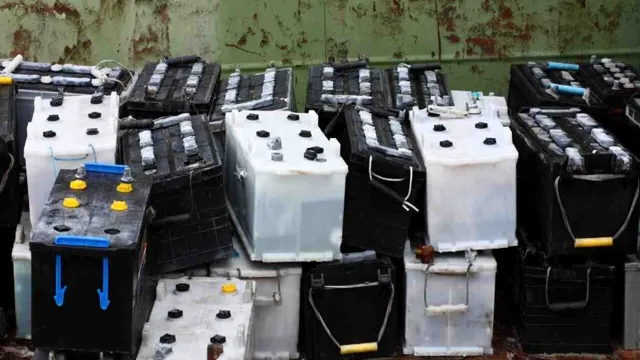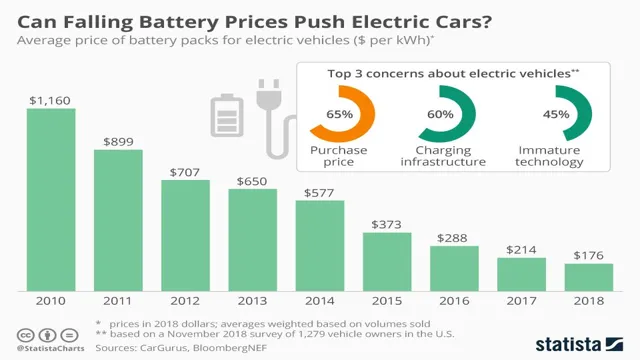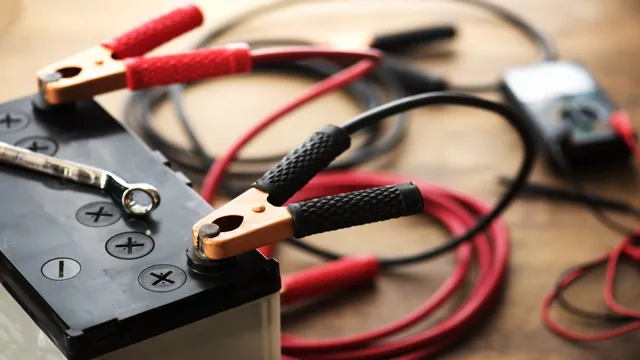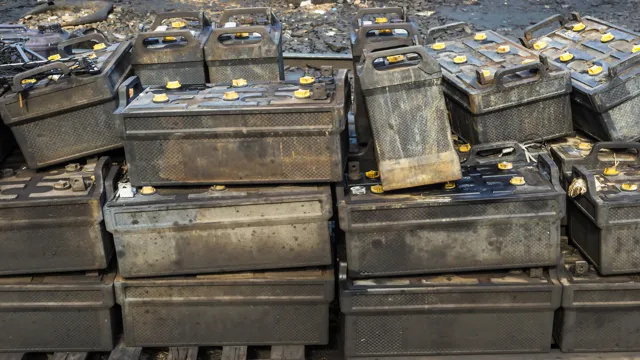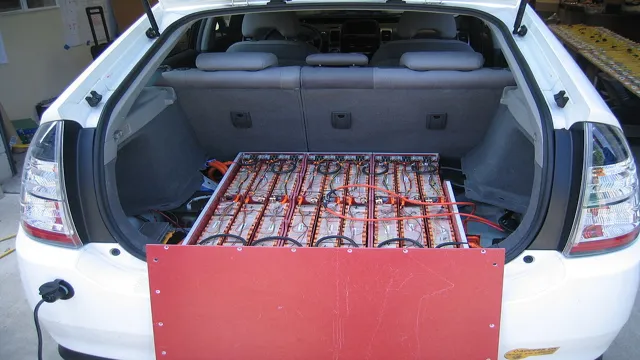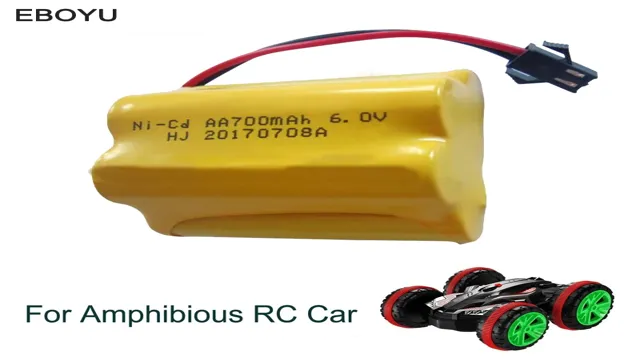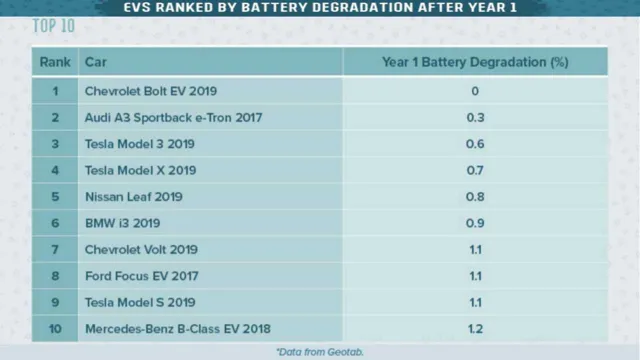Shocking Truth: Responsible Ways to Dispose Electric Car Batteries
As electric cars become increasingly popular, the question of what to do with their batteries once they’ve reached the end of their lifespan becomes more pressing. Electric cars offer a greener, more sustainable alternative to traditional fossil fuel-powered cars, but their batteries are bulky and can’t simply be thrown in the trash. So, how do we dispose of electric car batteries safely and efficiently? In this blog post, we’ll take a look at the options available and explore how we can responsibly dispose of electric car batteries without harming the environment.
The Problem with Electric Car Batteries
When it comes to e-cars, we often think about the benefits they offer like less emissions and better fuel economy compared to traditional cars. However, one important issue that we tend to overlook is the problem with disposing of electric car batteries. Electric car batteries are incredibly heavy and are made up of various toxic metals like cobalt, nickel, and lithium.
Over the years, these batteries tend to degrade, and car owners eventually have to replace them. Disposing of old batteries is a challenging process, and it can harm the environment if not done correctly. Without proper disposal, the chemicals used in electric car batteries can contaminate groundwater, pollute soil, and pose hazards to wildlife.
As such, there is a dire need for a comprehensive and long-term plan on how to deal with these batteries safely.
Environmental Impact of Improper Disposal
As the popularity of electric cars continues to rise, it’s important to consider the potential environmental impact of the batteries that power them. While electric car batteries certainly have their benefits, such as reduced emissions and improved efficiency, they also present a problem when it comes to disposal. Electric car batteries contain toxic substances that can be harmful to the environment if not disposed of properly.
Unfortunately, many batteries end up in landfills where they can leach harmful chemicals into the soil and water. This not only poses a risk to human health but can also harm wildlife and ecosystems. It’s important for manufacturers and consumers alike to consider the end-of-life implications of electric car batteries and work to find more sustainable solutions for their disposal.
By doing so, we can ensure that the benefits of electric cars don’t come at the expense of our planet.
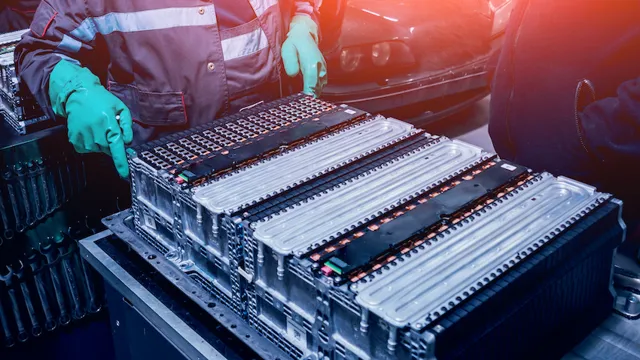
Health Risk of Toxic Battery Components
The problem with electric car batteries is the health risk associated with toxic battery components. These batteries are mainly made of lithium-ion, which is a highly toxic substance that can cause serious harm to humans and the environment. When disposed of improperly, they can release harmful gases and chemicals into the air and water, leading to air and water pollution.
Additionally, lithium-ion batteries can explode if they are damaged or overheated, which poses a serious safety hazard. To mitigate these risks, it is crucial to properly dispose of these batteries and recycle them to reduce their environmental impact. It is also important to handle the batteries with care and caution to prevent any injuries or accidents.
As the demand for electric cars continues to rise, it is necessary to address the health and safety concerns associated with the batteries.
Ways to Dispose of Electric Car Batteries
As electric cars become more popular, proper disposal of their batteries is becoming increasingly important. The batteries used in electric cars are composed of valuable and often toxic materials, like lithium and cobalt. To dispose of these batteries, recycling is the best option.
The recycling process involves breaking down the battery into its component parts, which can then be reused or sold for scrap. In addition to recycling, some car manufacturers offer recycling or take-back programs for their batteries. These programs often provide incentives for customers to return their old batteries.
However, if recycling or take-back programs are not available, a professional disposal service can be hired to properly dispose of the battery. Dumping electric car batteries in a landfill is not a viable option, as it poses environmental hazards and prevents valuable materials from being reused. So, let’s all do our part in disposing of electric car batteries responsibly to help protect our planet.
Recycling at Certified Facilities
Recycling Electric Car Batteries at Certified Facilities As the trend towards electric vehicles picks up, so does the question of how to dispose of their batteries. Electric car batteries contain various chemicals, including toxic ones such as lead, cobalt, and lithium. Therefore, disposing of them is a critical environmental issue that requires proper handling.
One of the ways to dispose of electric car batteries is by recycling them at certified facilities. These facilities are equipped to handle this kind of hazardous waste and can avoid contamination. The recycling process involves breaking down the battery into its components, stripping out the harmful chemicals, and recovering valuable materials such as cobalt and nickel.
The recycling of electric car batteries not only prevents future environmental damage but also reduces the need for new raw materials and saves energy. Recycling one ton of lithium batteries can save 5 tons of CO2 emissions compared to producing new ones.
Recycling electric car batteries at certified facilities is a responsible way to dispose of them. It reduces environmental damage, saves energy, and recovers valuable materials. Therefore, it is crucial to ensure that the electric car battery recycling process is sustainable to preserve the environment for future generations.
So, if you own an electric vehicle, make sure to recycle its batteries at certified facilities to make a greener impact.
Donating to Research Institutions
When it’s time to dispose of an electric car battery, there are several ways to do it, but donating it to a research institution is an excellent option. These batteries can still be useful for research purposes, even after they are no longer usable in a car. Research institutions can use them to experiment with new technologies or to try and improve existing battery technology.
Donating your electric car battery to a research institution is a great way to contribute to the advancement of sustainable energy production. It’s a responsible way to dispose of the battery, and it’s better for the environment than simply throwing it away. By donating it to a research institution, you can ensure that it will be put to good use, and it may even help to accelerate the development of electric vehicle technology.
Trade-In Programs with Car Manufacturers
If you’re an electric car owner, you may be wondering how to dispose of your car’s battery when it reaches the end of its lifespan. One option is to look into trade-in programs with car manufacturers. Many manufacturers are now offering incentives for customers to trade-in their old electric car batteries in exchange for new ones.
Some programs may even offer a discount on a new electric car purchase. Another option is to recycle the battery. While this may not be an option for most individuals, there are specialized companies that can handle the proper recycling of electric car batteries.
Regardless of the option chosen, it’s important to properly dispose of electric car batteries to prevent harm to the environment. By taking advantage of trade-in programs or recycling options, electric car owners can contribute to a more sustainable future.
Future of Electric Car Battery Disposal
As electric vehicles are becoming more popular, the question of how to dispose of their batteries is becoming increasingly important. Electric car batteries contain materials such as lithium, nickel, and cobalt, which are valuable and can be recycled. However, the process of recycling these batteries is complex and expensive.
If not recycled properly, these batteries pose a threat to the environment due to the release of toxic chemicals. To combat this issue, some car manufacturers are implementing buyback programs where they will take back the batteries once they reach the end of their life and properly recycle them. Another solution being explored is repurposing old batteries for other uses such as energy storage for renewable energy systems.
Disposing of electric car batteries is an important issue that needs to be addressed as electric vehicles become more mainstream. Companies need to take responsibility and find sustainable ways to recycle or repurpose these batteries to ensure the safety of our environment.
Innovations in Sustainable Battery Recycling
Sustainable Battery Recycling As the demand for electric cars continues to soar, the issue of what happens to the batteries once they have reached the end of their life has become more pressing. Conventional battery recycling methods have been criticized for not being environmentally friendly, but innovations in sustainable battery recycling are offering hope for a greener future. Companies are developing new processes that recover valuable materials from used batteries while minimizing waste and pollution.
The future of electric car battery disposal is looking brighter, thanks to these advancements in sustainable technology. With the growing need for clean energy solutions, we can all look forward to a future where electric cars don’t just benefit the environment, but their batteries can be disposed of sustainably too.
Government Regulations for Proper Disposal
As electric car usage continues to grow, government regulations for proper disposal of their batteries are becoming increasingly important. It’s essential that these regulations ensure the safe and environmentally conscious handling of lithium-ion batteries once they reach the end of their lifespan. Thankfully, many countries are already implementing policies and regulations to ensure responsible disposal, including recycling programs and safe handling procedures.
The future of electric car battery disposal ultimately depends on continued commitment to sustainability and responsible waste management. As the demand for electric vehicles grows, so too does the need for efficient and responsible battery disposal methods, which will have a significant impact on the health of our planet for generations to come.
Conclusion
In conclusion, disposing of electric car batteries is a shocking responsibility. However, just like with any waste, we must take it seriously and dispose of it in a responsible and environmentally-friendly manner. After all, we don’t want to spark any negative impact on our planet.
So, let’s make sure we properly dispose of these batteries, instead of shocking ourselves with the consequences of not doing so.”
FAQs
How should electric car batteries be disposed of?
Electric car batteries should be taken to a specialized recycling facility for proper disposal. These facilities can extract valuable materials and prevent harmful chemicals from harming the environment.
Can electric car batteries be recycled?
Yes, electric car batteries can be recycled. Recycling facilities can recover valuable metals, such as lithium, cobalt, and nickel, from the batteries and reuse them for new battery production.
What are the environmental impacts of improperly disposing electric car batteries?
Improperly disposing electric car batteries can lead to soil and water pollution. The batteries contain toxic chemicals that can leach into the environment, posing a threat to human health and wildlife.
How long do electric car batteries last before needing to be replaced?
The lifespan of electric car batteries can vary, but most last between 8-10 years before needing to be replaced. After this time, the batteries may lose their efficiency and require replacement.
